TALES OF MY FATHER
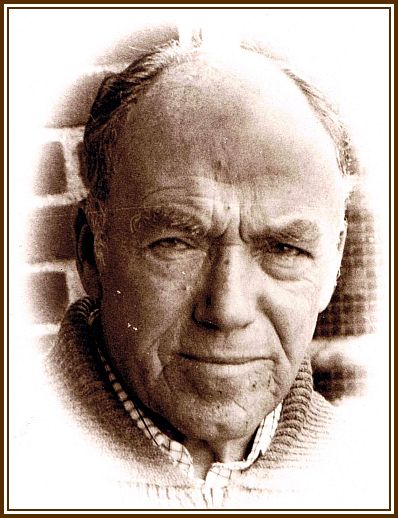
My Father, Charles Henry Jenkins (1908-1989)
Jack-of-all-Trades, Master-of-None ……. an enigma
-oOo-
TALE SIX :
THE WAR YEARS AND
THE LIBERATION OF BERGEN-BELSEN
-oOo-
THIS TALE IS DEDICATED TO THOSE PEOPLE WHO SUFFERED THROUGH THE SECOND WORLD WAR AND THOSE WHO LOST THEIR LIVES AT THE HANDS OF THE REGIME.
IT IS OUR DUTY TO ENSURE THAT SUCH EVENTS STOP HAPPENING.
-oOo-
IF THE FOLLOWING ACCOUNT UPSETS, ANGERS
OR DISTURBS ANY READER,
PLEASE ACCEPT MY REGRETS AND APOLOGIES.
PLEASE BE AWARE THAT WHAT FOLLOWS IS
THE BRIEFEST OF ACCOUNTS ON THE RISE OF THE NAZIS
AND DOES NOT PRETEND IN ANYWAY
TO BE A FULL AND COMPREHENSIVE HISTORY.
I AM SURE THAT THERE WILL BE MANY READERS
WHO WILL TAKE UMBRIDGE AT WHAT I HAVE WRITTEN.
THIS IS NOT MY INTENTION.
THE PURPOSE OF THE ACCOUNT
IS SIMPLY TO GIVE A BRIEF BACKGROUND LEADING TO WHAT
MY FATHER, LIKE MANY OTHERS OF THE TIME, SUFFERED
WHEN THEY CAME TO BERGEN-BELSEN AND OTHER SUCH CAMPS.
-oOo-
PAGE THREE:
THE OUTBREAK OF
THE SECOND WORLD WAR
-oOo-
The period between the Declaration of War by Britain, Commonwealth Countries and France on the 3rd September, 1939 until the 10th May, 1940 has come to be known as The Phoney War (French: Drôle de Guerre; German: Sitzkrieg) since no major military land operations occurred at this time. Although no major military land operations occurred, a number of so-called minor interactions between forces did take place. However what took place on the 10th May, 1940 was to make it clear to all interested parties that the war was no longer phoney, but was now being waged in earnest.
-oOo-
During The Phoney War, my mother said that the way of life did not seem very different to as it was prior to The Declaration of War except, that is, Rationing of Goods, which had been introduced immediately afterwards. At this time, Britain imported much of its food and, as it was one of the German strategies to attack shipping bound for Britain, the Ministry of Food introduced the British public to the Ration Book with its Coupons where the populace would be limited in the amount of certain goods that could be bought. A specific number of Coupons were exchanged for a specific amount of a provision or a garment etc along with regular payment. Rationing was also extended to restaurants and restrictions were introduced on the number of courses offered to the public. Rationing had also been introduced to impede bulk buying and the hording of some commodities. Despite all efforts, shops often failed to carry goods that the populace believed to be necessities.
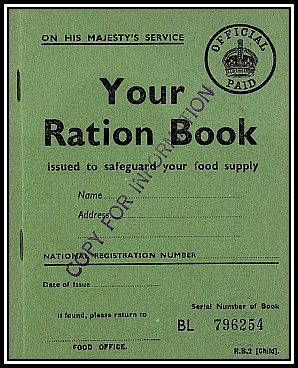 A Child’s Ration Book
A Child’s Ration Book
My mother said that she was required to register with certain shops and restrict her purchases to those particular establishment. Since my parents did not have children at this time, the number of Coupons in their Ration Book reflected this. Once my father was called up in late 1939 and left for military training, her Coupons were reduced.
While working for British Railways, my mother worked with a number of men who kept chickens and rabbits and who grew vegetables. Occasionally she was lucky enough to be given a few vegetables and an egg or two. Apparently, a person was allowed one egg per fortnight once the war got going! Once, she said, that she had been given a rabbit to cook. Apparently, rabbit was on the menu quite often for many during the war years. My mother refused to cook or eat rabbit once the war finally came to an end!
-oOo-
In May 1940, Nazi-Germany attacked France and the Low Countries in what has come to be known as The Battle of France (10th May-25th June, 1940). Luxembourg, The Netherlands and Belgium fell quickly and unfortunately French troops were able to do little better against the fast-moving invading forces. Such an attack is known as Blitzkrieg, which is defined as an intense military campaign intended to bring about a swift victory.
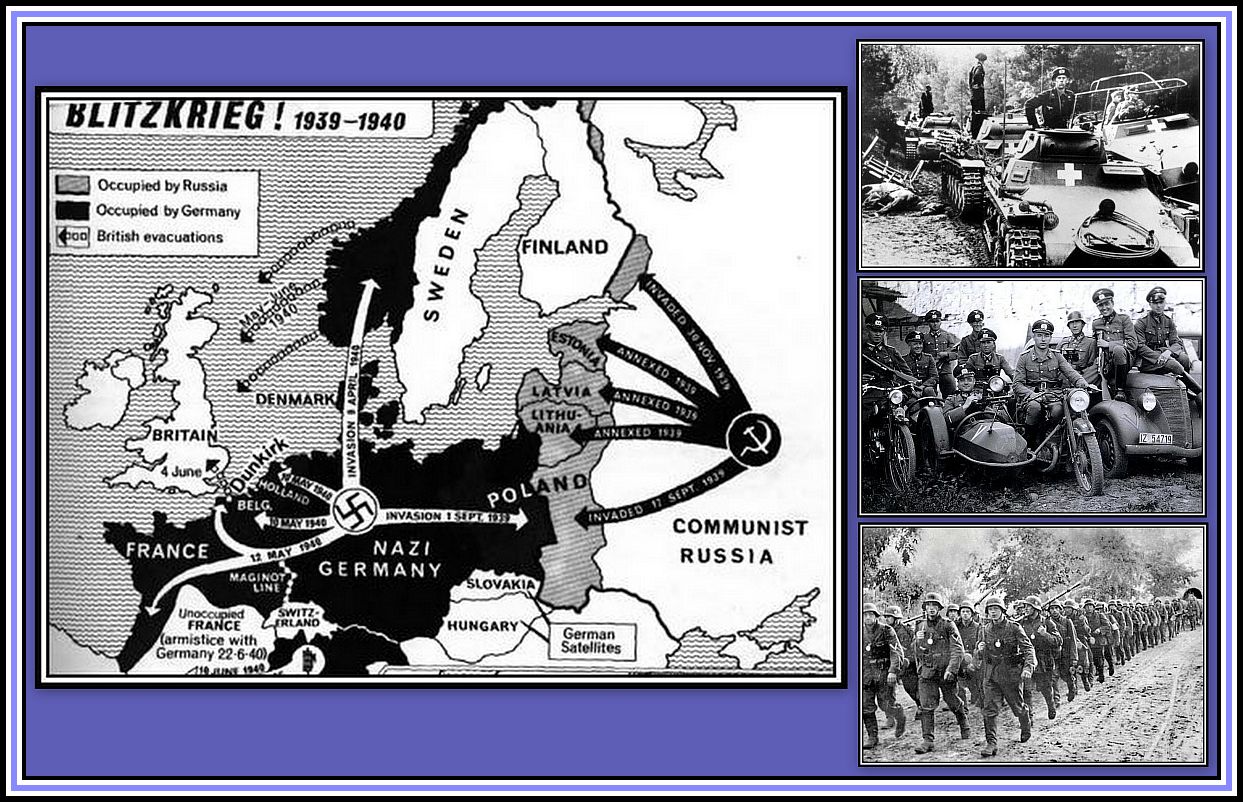 Blitzkrieg (1939-1940)
Blitzkrieg (1939-1940)
On the 14th June, 1940, German forces marched unopposed into Paris. This took place following a chaotic period of the French Government, which led to the collapse of the large French army and followed by the country’s surrender on the 22nd June, 1940.
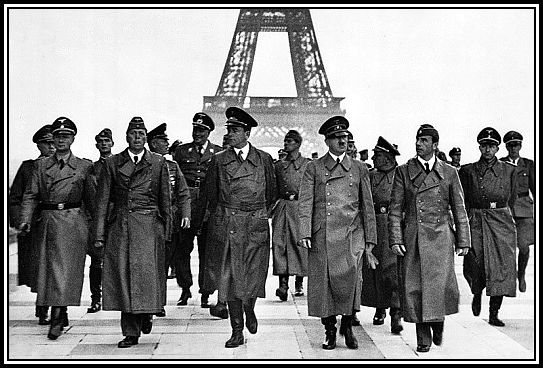 Herr Hitler & his entourage touring Paris on the 23rd June, 1940
Herr Hitler & his entourage touring Paris on the 23rd June, 1940
-oOo-
During The Battle of France, British, Belgian and French forces were pushed back to the sea at Dunkirk and became surrounded by the mobile and well-organised German forces. The British Expeditionary Force (BEF) and several French divisions were evacuated from Dunkirk in Operation Dynamo (26th May-June 4th June, 1940).
Through Operation Dynamo, 338,226 soldiers were rescued by an assembled fleet of over 800 boats comprising of a number of British Destroyers and other large ships together with a flotilla of hundreds of Merchant Marine boats, Fishing Boats, Pleasure Craft, and Lifeboats that had been called into service to help save The Force. Approximately 68,000 British soldiers were lost during the campaign and most of their equipment had to be left behind.
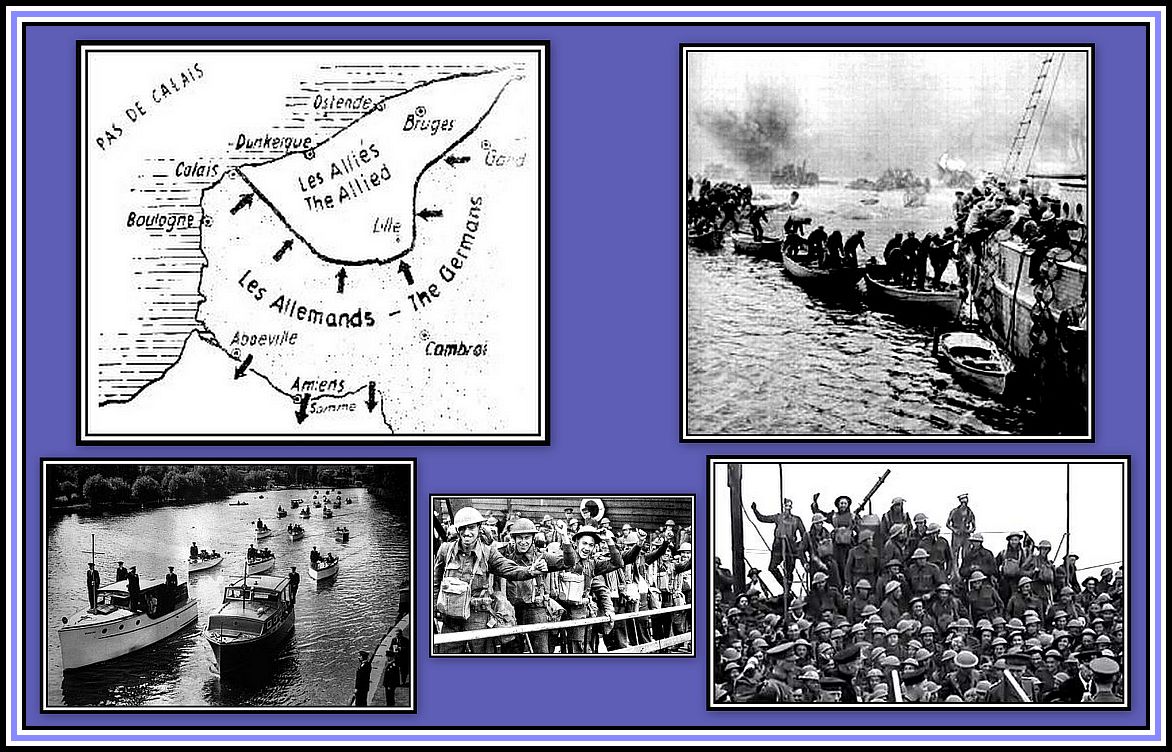 Operation Dynamo
Operation Dynamo
With the evacuation of the BEF from Dunkirk, no allied troops were to land on Continental Europe soil, other than for specific attacks on places of strategic importance to The Third Reich, until D-Day, Tuesday the 6th June, 1944.
-oOo-
The British Prime Minister between 1937 and 1940 was Mr. Neville Chamberlain (1869-1940) who followed a foreign policy of Appeasement, which led to the signing of The Munich Agreement in 1938. This led to the German-speaking area of Czechoslovakia, the Sudetenland, being conceded to Germany and a belief that there would be Peace in Our Time.
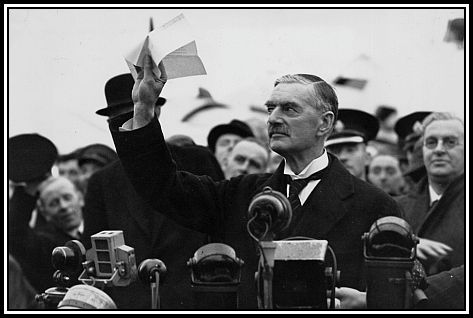
Mr. Chamberlain speech upon returning from Munich on the 30th September, 1938
-oOo-
However, as a result of the invasion of Poland by troops of The Third Reich on the 1st September, 1939 and their unwillingness to withdraw, Britain, the Commonwealth Countries and France declared war on Germany.
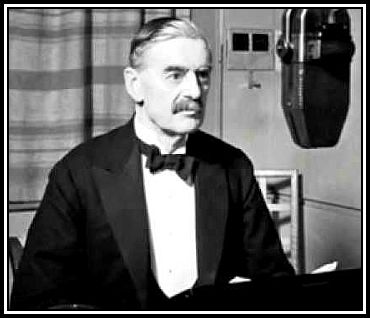
Mr. Chamberlain announces that a state of war exists between Britain and Germany on the
3rd September, 1939
-oOo-
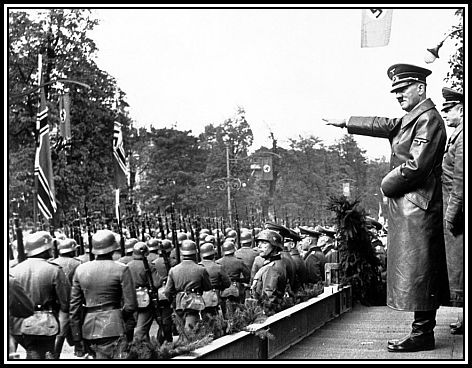 Herr Hitler in Warsaw, October 1939
Herr Hitler in Warsaw, October 1939
-oOo-
Mr. Chamberlain continued as Britain’s Prime Minister until the 10th May, 1940 when he resigned the position and Mr. Winston Churchill (1874-1965) then assumed the role.
Mr. Chamberlain resigns as Prime Minister on the 10th May, 1940
-oOo-
Apparently Mr. Chamberlain was renowned for always carrying an umbrella. He was associated with the accessory much as Mr. Churchill became associated with a cigar, Anthony Eden (1897-1977) with the Homburg Hat and Mrs. Thacher with her handbag.
BBC Radio Four Programme presented on the 6th March, 2017 entitled
Mr. Chamberlain’s Umbrella

-oOo-

As Prime Minister, Mr. Churchill made three speeches during The Battle of France. Each proved to be inspiring to listeners.
-oOo-
In his first speech as Prime Minister made to The House of Commons on the 13th May, 1940, Mr. Churchill told members that he was forming a national government that would be a Coalition involving all parties and that it would wage war on Germany. His speech contains the expression Blood, Toil, Tears and Sweat and here he asks fellow members of The Commons to declare its confidence in his Government, which was unanimously given.
Richard Burton (1925-1984), as Winston Churchill in the television play, The Gathering Storm (1974), giving his first speech as Prime Minister to The House of Commons on the 13th May, 1940
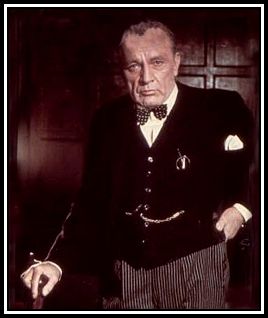 Richard Burton as Winston Churchill (1974)
Richard Burton as Winston Churchill (1974)
Click here to watch the play, The Gathering Storm (1974)
-oOo-
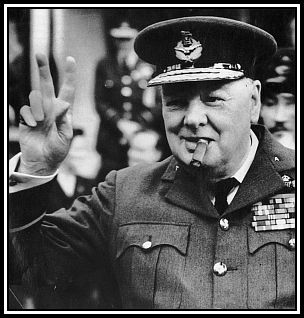
Mr. Churchill’s second speech during this time was given on the 4th June, 1940. Although the populace felt great relief at the unexpected deliverance of the soldiers isolated on the beaches at Dunkirk, the coming peril facing the country was now fully perceived. In this speech, Mr. Churchill told the country and the world that despite the horrors now facing Britain, the country would stand firm. This speech has become known as the We Shall Fight on the Beaches speech:
At 11 minutes 5 seconds: We shall go on to the end. We shall fight in France, we shall fight on the seas and oceans, we shall fight with growing confidence and growing strength in the air ……. We shall defend our Island, whatever the cost may be; we shall fight on the beaches, we shall fight on the landing grounds, we shall fight in the fields and in the streets, we shall fight in the hills; we shall never surrender…
-oOo-
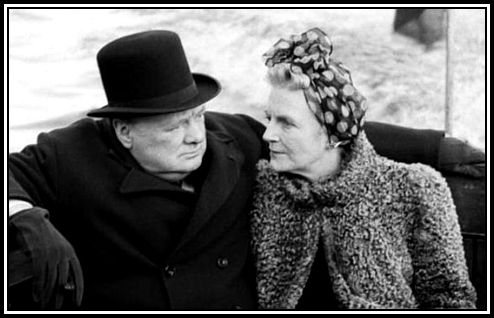 Mr. Churchill with his wife, Clementine (1885-1977)
Mr. Churchill with his wife, Clementine (1885-1977)
The third speech was given to members of The House of Commons on the 18th June, 1940. France had just surrendered under the force of The Third Reich and now Mr. Churchill had to explain the dire situation and yet still remain positive in the coming long fight. This speech has become known as This was their finest hour speech:
What General Weygand called the Battle of France is over. I expect that the Battle of Britain is about to begin … Hitler knows that he will have to break us in this Island or lose the war. If we can stand up to him, all Europe may be free and the life of the world may move forward into broad, sunlit uplands. But if we fail, then the whole world, including the United States, including all that we have known and cared for, will sink into the abyss of a new Dark Age made more sinister, and perhaps more protracted, by the lights of perverted science. Let us therefore brace ourselves to our duties, and so bear ourselves that, if the British Empire and its Commonwealth last for a thousand years, men will still say, “This was their finest hour”.
-oOo-
Following the fall of France, Britain and Commonwealth Countries were the only countries now facing the might of The Third Reich. Although Herr Hitler apparently believed that since Britain now stood alone with no European allies free to join the fight, the country would quickly capitulate and agree to an armistice. Despite the circumstances Mr.Churchill refused and told the British public that they should prepare for a long war..
-oOo-
Following its victory in The Battle of France, Nazi Germany turned its attention to Britain. Between the 10th July until the 31st October, 1940, Herr Hitler sent the Luftwaffe to attack Britain by air in what is known as The Battle of Britain.
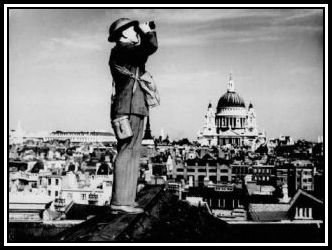 Watching for Enemy Aircraft over London
Watching for Enemy Aircraft over London
Nazi-Germany’s main aim here was to force Britain to surrender and agree to an Armistice and assumed that since they enjoyed air superiority it would soon obtain victory over the Royal Air Force (RAF). However, Herr Hitler underestimated the ability of the RAF’s young pilots and the resolve of the British population. The Battle of Britain was to be the first major campaign that was fought entirely by air forces.
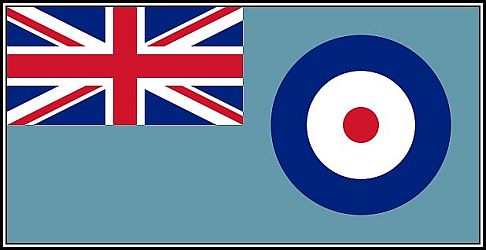 The Ensign of the Royal Air Force (RAF)
The Ensign of the Royal Air Force (RAF)
On the 15th August, 1940, The Battle of Britain reached a crisis point with all of the resources of Fighter Command in the South of England being used. Following the RAF’s magnificent defiance of the Luftwaffe, Mr. Churchill gave a stirring tribute to the fighter pilots who had fought so valiantly in the skies over Britain in a speech given on the 20th August, which included the words, Never in the field of human conflict was so much owed by so many to so few:
-oOo-
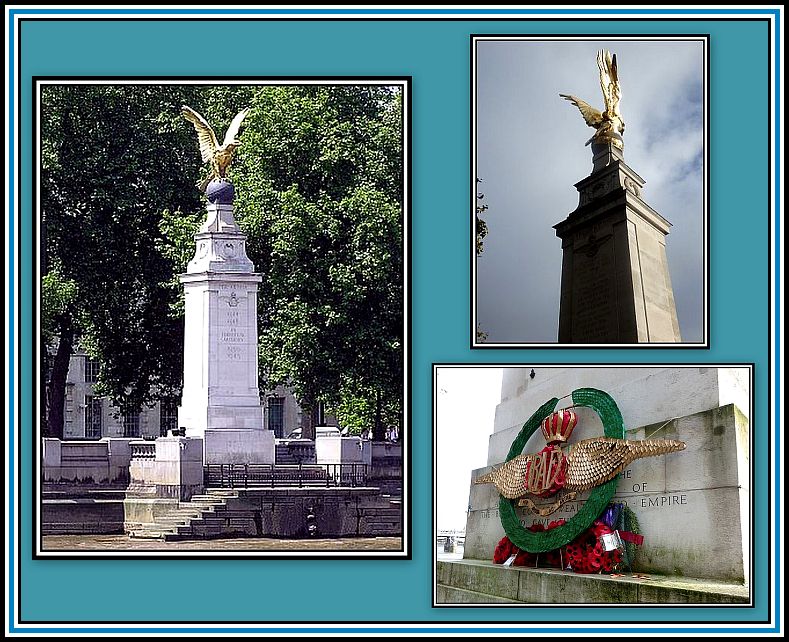 Royal Air Force Memorial on the Embankment and erected in 1923
Royal Air Force Memorial on the Embankment and erected in 1923
The memorial was designed by Sir Reginald Blomfield (1856-1942) and
The Eagle was sculpted by Sir William Reid Dick (1879-1961)
The RAF inflicted defeat on the Luftwaffe in The Battle of Britain, thereby denying Herr Hitler air superiority, which he required for his planned naval invasion of Britain. Failure to destroy Britain’s air defenses and force an armistice is considered to be Nazi-Germany’s first major defeat in the Second World War. Of the 2,936 airmen who took part in The Battle of Britain and are on the RAF Honour Roll, 595 pilots came from Commonwealth Countries, Europe and elsewhere.
Herr Hitler had planned to invade Britain by sea and air in what was to be Operation Sea Lion (German: Seelöwe). However with the failure of the Luftwaffe to subdue the RAF and the raids on Britain to demoralise the British public, Herr Hitler was forced to abandon this plan. In view of the result, Herr Hitler announced that Nazi-Germany would postpone invasion of Britain until a later date.
In place of the naval assault, he ordered nightly air raids on British cities where the Luftwaffe targeted airfields, factories, docklands and later buildings of significance resulting in many civilians being killed. Between July and December 1940, it has been estimated that ~23,000 civilians were killed with approximately an additional 32,000 being injured.
-oOo-
IMAGES OF THE BLITZ
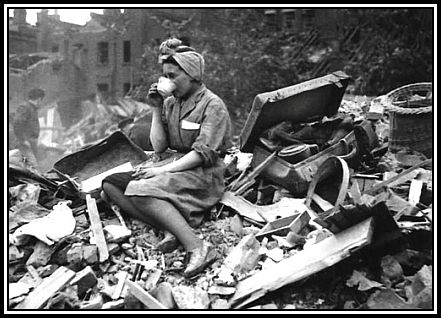
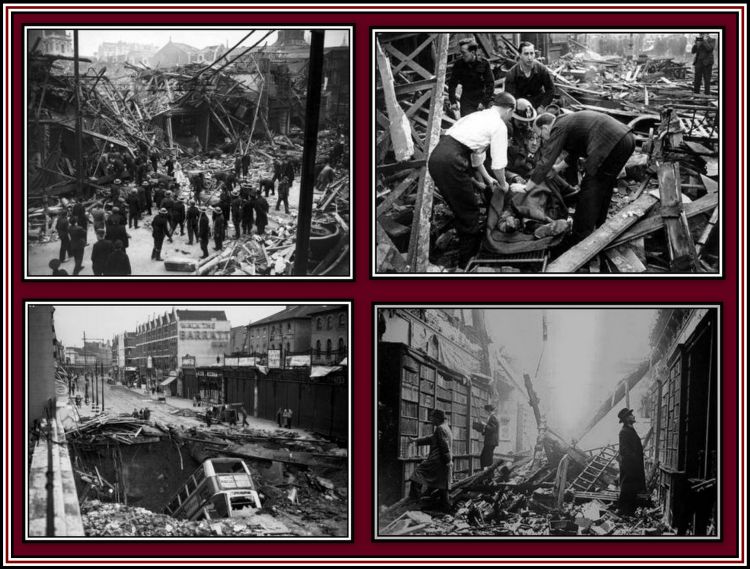
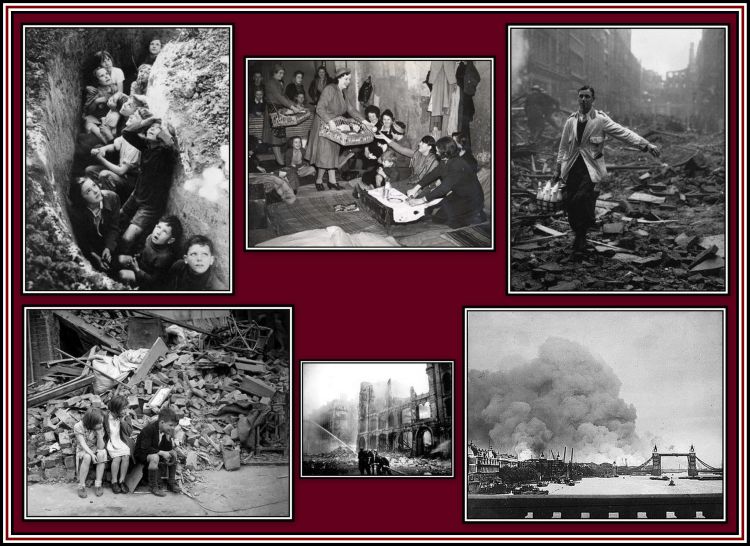
-oOo-
As part of the War Effort, many women were required to work. This was deemed necessary since most of the men of working age were being called up to serve in the military. Exceptions were made to those who worked in particular areas considered vital to the War Effort.
My mother was given the choice between working for British Railways during the Second World War (see Women at War to read about the efforts made by women during this time including those of my mother) or else working in a Ammunitions Factory. Since she knew a young woman who had gone to work in such a factory and had been killed in an explosion, she chose to work on The Railways.
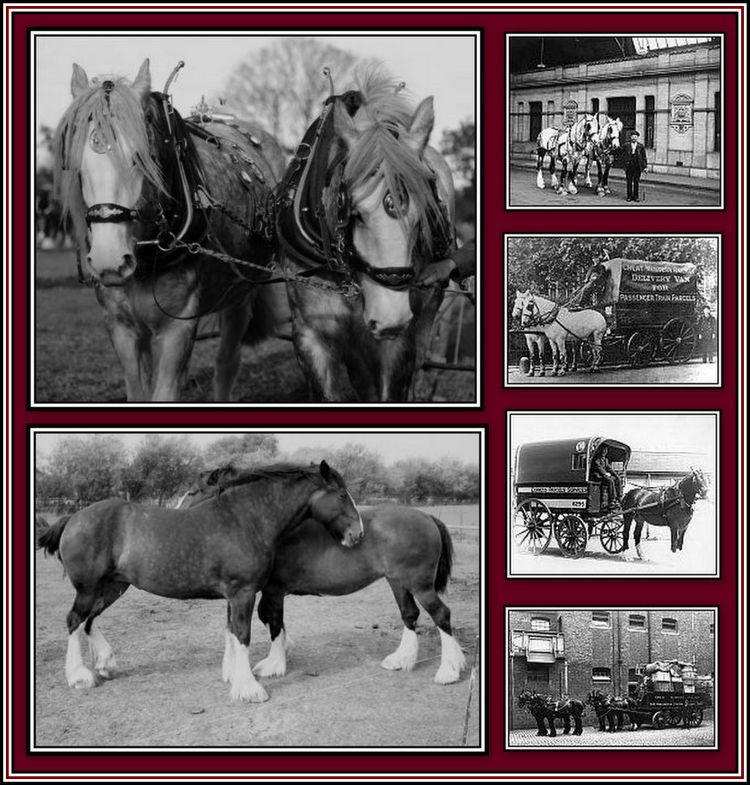
Her work with British Railways consisted of making deliveries in The City of London and around The London Docks. Deliveries were made by driving a team of Belgian Horses pulling a huge cart filled with large boxes that she had had to load herself. In addition to her Day Work, she was required to undertake Fire Watching Duty on many of the evenings and nights throughout the duration of The War. Her work and Fire Watching Duties continued during her pregnancy and following my birth.
-oOo-
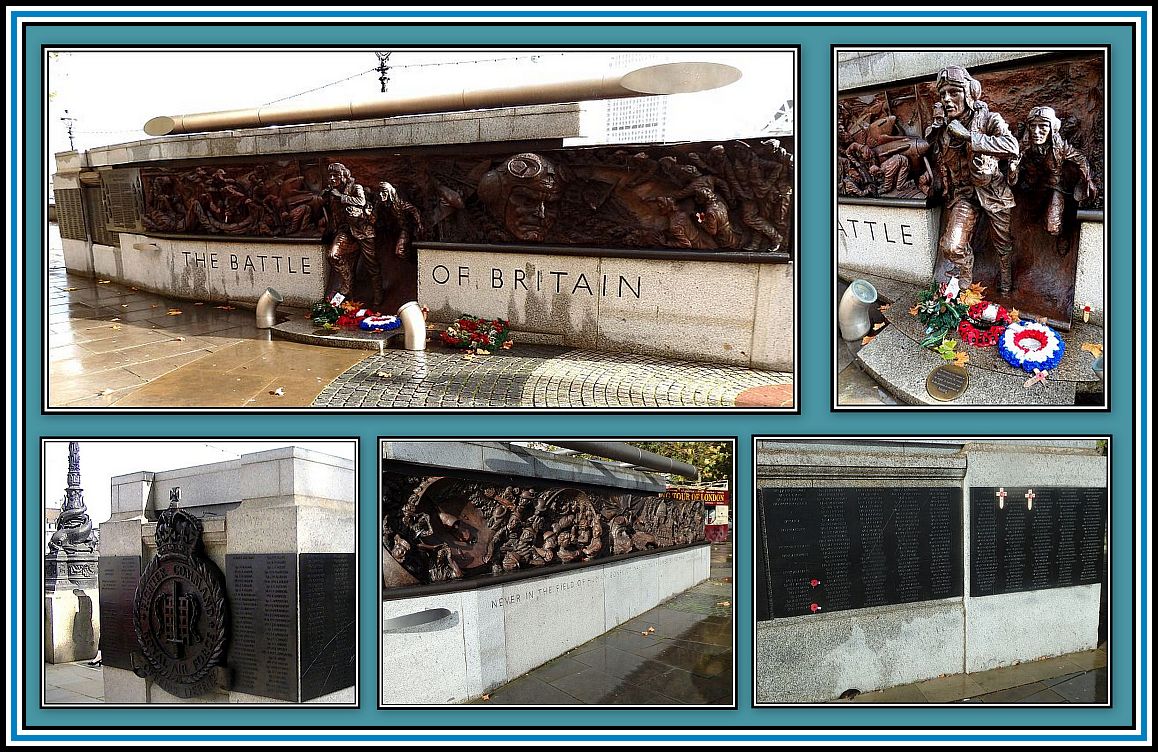 The Battle of Britain Monument
The Battle of Britain Monument
The Monument was unveiled on the 18th September, 2005,
the 65th Anniversary of The Battle.
The sculptor of The Monument was Paul Day and the statues were cast by
Morris Singer, the oldest established fine art foundry in the world.
-oOo-
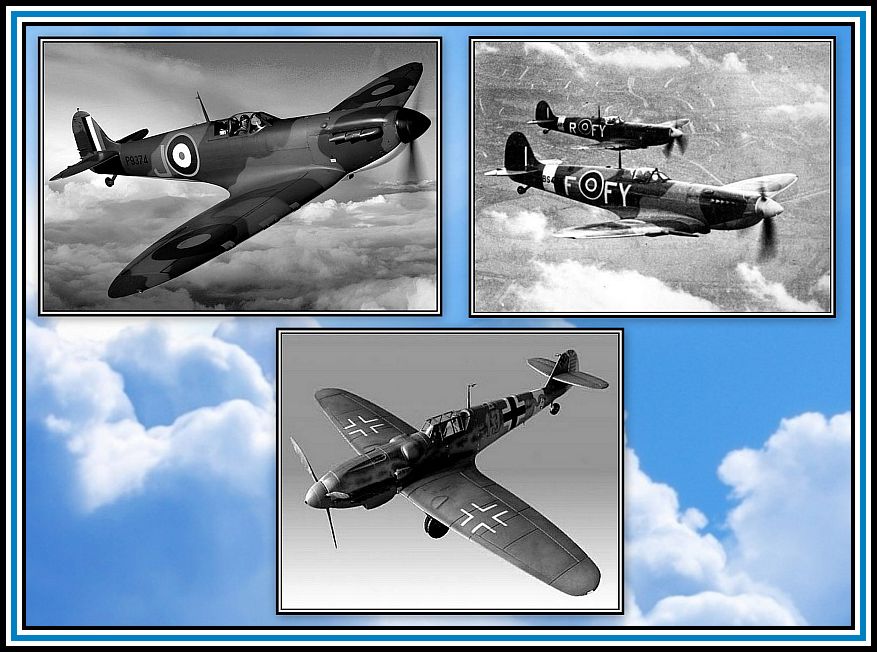 Aircraft employed during The Battle of Britain
Aircraft employed during The Battle of Britain
Among the aircraft used were The Hawker Hurricane (Upper Left), The Supermarine Spitfire Mk 1 (Upper Right) and The Messerschmitt Bf 109 (Bottom)
The actual number of aeroplanes and military personnel lost on both sides during The Battle of Britain is unclear and figures appearing in the literature vary depending on the source. Although the actual number of those killed in The Battle may be unclear, one thing is certain: those killed on both sides were never to fulfill their dreams and were denied living full and active lives. But, tragically this is the way of war.
-oOo-
The result of The Battle of Britain was to have a profound effect on the opinion of the American Government. During The Battle, it was believed that Britain would not survive the onslaught of The Luftwaffe. However, President Roosevelt (1882-1945) decided that he needed a second opinion on this matter and sent an envoy to Britain to assess the situation. The envoy did as he was asked and became convinced that Britain would tolerate the onslaught and suggested that the country should be given all support in its efforts. As a result of this advice, the President gave full support to the Britain.
-oOo-
On the 29th October, 1941, Mr. Churchill returned to his old school, Harrow, where he was treated to a series of school songs. At this time, he gave a speech that has become known as his Never, Never, Never Give In speech:
-oOo-
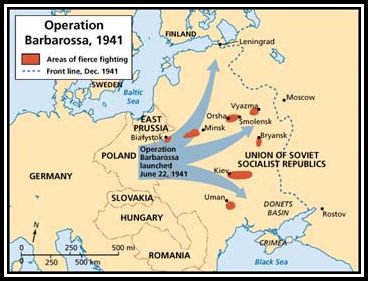
After The Battle of Britain, Britain together with the Commonwealth Countries and a number of European Armies in exile working with the British Military, continued to fight Nazi-Germany. On the 22nd June, 1941, Nazi-Germany, together with support from Italy and Romania, launched Operation Barbarossa where they attacked the U.S.S.R., which resulted in it joining The Second World War.
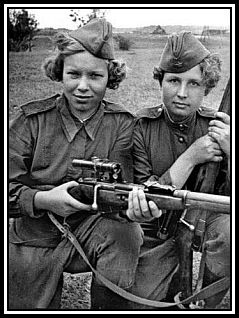 Russian Girl Snipers
Russian Girl Snipers
-oOo-
The war against Nazi-Germany along with Italy (Axis Powers: Nazi-Germany, Italy and Japan) was not only fought in Europe, but also in North Africa and the Middle East. From the 10th June, 1940 until the 13th May, 1943, campaigns were fought in the Libyan and Egyptian Deserts (i.e. The Desert War also known as the Western Desert Campaign). The U.S. become involved in the conflict on the 11th May, 1942, as a result of its entry into the war in December 1941.
Since the Italian 10th Army had been destroyed during Operation Compass (9th December, 1940-9th February, 1941), the Deutsches Afrika Korps (DAK) was sent to North Africa. The Korps was under the command of Field Marshal Erwin Rommel (1891-1944) whose efforts in the area resulted in journalists naming him, The Desert Fox.
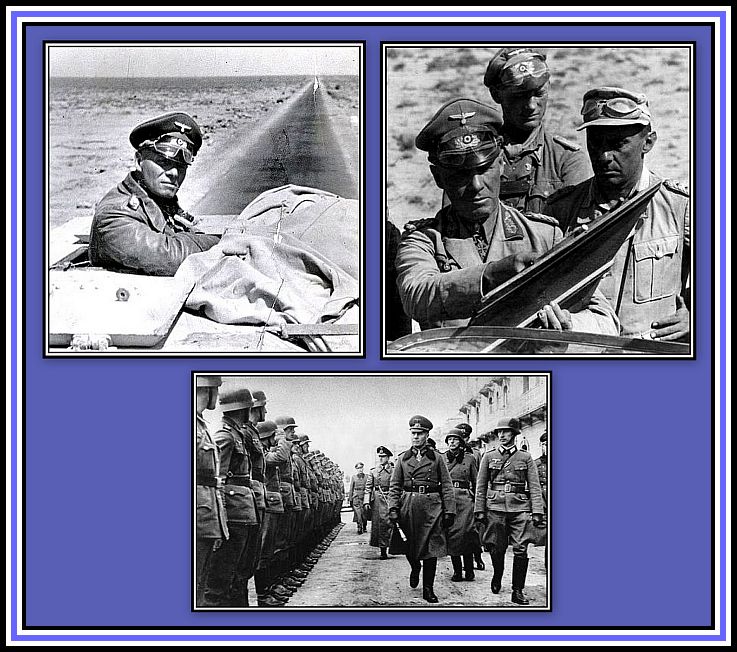 Field Marshal Erwin Rommel
Field Marshal Erwin Rommel
On the 8th August, 1942, Field Marshal Bernard Montgomery (1887-1976) was sent to North Africa and became the commander of the British Eighth Army. The Field Marshals clashed in November 1942 at the Second Battle of El Alamein, which proved to be a decisive victory for the Allied Forces that led to the Axis surrender in May 1943.
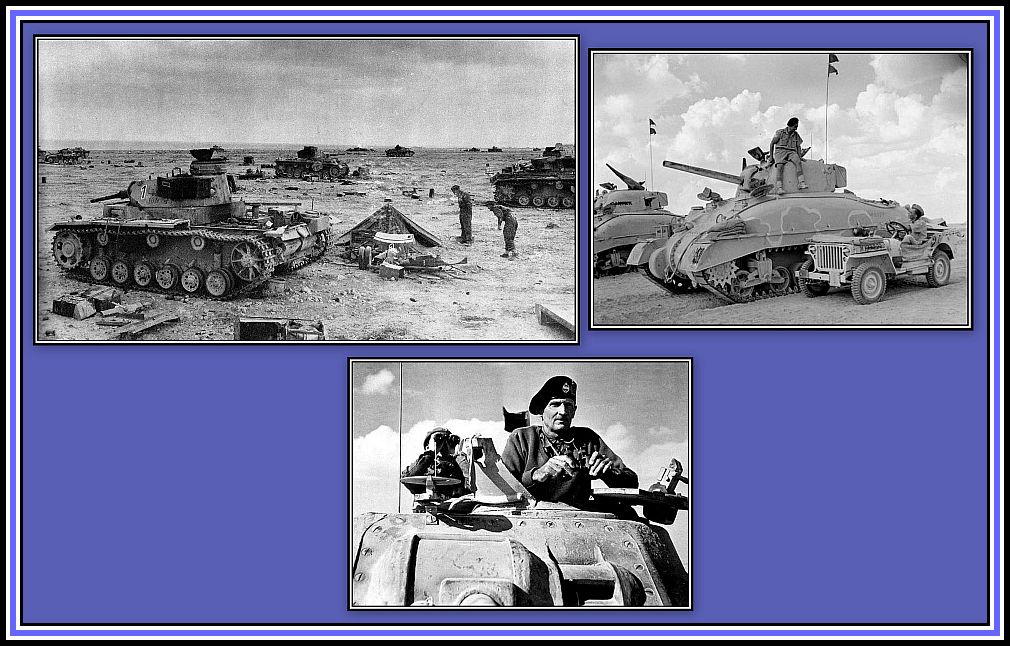 The Eighth Army in The Desert
The Eighth Army in The Desert
Bottom: Field Marshall Bernard Montgomery
-oOo-
Mr. Churchill gave a speech at the Lord Mayor of London’s Luncheon held at the Mansion House on the 9th November, 1942 where he gave news of the victory of the British Eighth Army where he gave his This is not the end, it is not even the beginning of the end, but perhaps it is the end of the beginning speech:

-oOo-
-oOo-
On the 7th December, 1941, the Imperial Japanese Navy Air Service attacked the U.S. naval base at Pearl Harbour, Hawaii. This action was undertaken to prevent the U.S. Pacific Fleet from impeding Japanese planned military action in south-east Asia against territories of the U.S., Britain and The Netherlands. Following The Attack On Pearl Harbor, the Japanese undertook attacks on The Philippines, Guam, Wake Island, Thailand, Malaya, Singapore and Hong Kong. These attacks led the U.S., Britain, China, Australia and other Commonwealth Countries to formally declare war on Japan. This, in turn, led to Nazi-Germany and supporters declaring war on the U.S. At this time the U.S.S.R. maintained neutrality in the conflict with Japan and would continue to do so until three months after the Yalta Conference held on the 4th-11th February, 1945 when they joined the Allies in the this conflict.
With the spreading or fighting and the inclusion of more countries in the numerous conflicts, it appeared that THE WHOLE WORLD was now at war.
-oOo-
On D-Day, the 6th June, 1944, the Allies landed on the Normandy beaches while the U.S.S.R. was battling Nazi-Germany from the east. Together each planned to arrive in Berlin and bring about the final defeat of Nazi-Germany. Although they did achieve their goals and defeated the enemy, nothing, ABSOLUTELY NOTHING could have prepared them for what they found en route.
——-oooOOOooo——-
Click here to GO to PAGE FOUR:
I: THE LIBERATION OF THE CONCENTRATION CAMP AT BERGEN-BELSEN
-oOo-
Click here to RETURN to PAGE TWO:
THE THIRD REICH
-oOo-
Click here to RETURN to the HOME PAGE
of TALE SIX
-oOo-
Click here to RETURN to the HOME PAGE
of TALES OF MY FATHER
-oOo-
Click here to RETURN to the TABLE OF CONTENTS
—oooOooo—
